

The music magazine Songlines has just announced winners of its annual world music awards and we are pleased that our Damir Imamović has won in The Best of Europe category! Damir is being awarded for the success of his latest album „Singer of Tales“ that was released by Wrasse Records in April 2020.
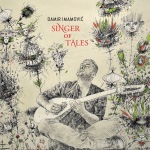
After Songlines announced the nominees for its prestigious awards in early April, it became clear that Damir's work brought a lot of international attention. He was the only artist this year to be nominated in two categories: „The best of Europe“ and „The best artist“. „The best of Europe“ categories also included nominees such as Mariza (Portugal), Sam Lee (Great Britain) and Cocanha (France). The award ceremony will take place at the end of the year in London.
Even the pandemic of Covid19 could not stop Damir's international success. His „Singer of Tales“ album topped the international music charts for months. The awards followed and the album won the recognition of the Transglobal World Music Charts for the best European album of 2020, a quarterly award for the best folk music album by German Association of music critics and was voted as one of top 10 albums in the UK by Songlines.
The album „Singer of Tales“ was produced by the legendary producer Joe Boyd (R.E.M, Nick Drake, Pink Floyd) and Andrea Goertler (Saz'iso) and presented Damir's story of the traditional music of Bosnia-Herzegovina backed by the stellar line-up: violinist Ivana Đurić (Damir Imamović Sevdah Takht), kemenche master Derya Türkan (Kudsi Erguner, Erkan Oğur) and double-bass player Greg Cohen (Tom Waits, Laurie Anderson, Masada, John Zorn).
Songlines Music Awards have been established in 2009 and continue the tradition of the famous BBC3 World Music awards. Since 2016 the awards are being given in regional categories. Some of the previous winners have been: Bassekou Kouyaté, Mariza, Fanfare Ciocărlia, Seckou Keita, Goran Bregović, Derek Gripper…
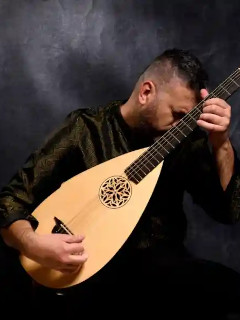
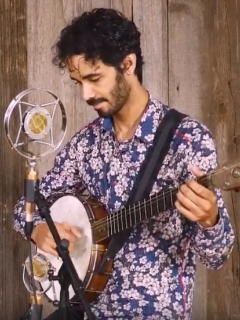
Africa & Middle East
WINNER: Siti Muharam
Afel Bocoum | Groupe RTD | Star Feminine Band
Americas
WINNER: Jake Blount
Kiko Dinucci | Kronos Quartet | Lido Pimienta
Asia & Pacific
WINNER: Khusugtun
Jangar | Saigon Soul Revival | Tio
Europe
WINNER: Damir Imamović
Cocanha | Sam Lee | Mariza
Fusion
WINNER: Bab L’ Bluz
DakhaBrakha | Wu Fei & Abigail Washburn | Lo’Jo
Best Artist
WINNER: Liraz
Yilian Cañizares | Damir Imamović | Melingo
Best Group
WINNER: Ayom
Orkesta Mendoza | Tamikrest | Zoufris Maracas

“More than anything we’re a rock band,” insists Yousra Mansour, fearless frontwoman with Bab L’ Bluz. Yet the Moroccan-French quartet are a rock band like no other. Hypnotic Gnawa loops combine with a deep funk played on traditional instruments such as awicha and gimbri. Moroccan chaabi is spiced with contemporary trance and the clattering percussion of qaraqab (metal castanets), while the propulsive drumming is enhanced by a turned-on-tuned-in 21st century psych groove. Formed in 2018, Bab L’ Bluz channel a huge range of influences into music that crosses borders and travels through time. Representing Morocco’s Nayda youth movement – a new wave of artists and musicians who have brought about a cultural revolution in recent years – no small part of the Bab L’ Bluz revolution is Mansour herself, a pioneering woman and an electrifying presence in a traditionally male-dominated domain. Accompanied by French gimbri player, producer and multi-instrumentalist Brice Bottin, flautist Jérôme Bartholomé and drummer Hafid Zouaoui, Mansour’s hymns of freedom are sung in the Moroccan-Arabic dialect of Darija and the group’s debut album is a thrilling manifesto of expansive musical invention. “All of us in Bab L’ Bluz believe that art can open minds and change mentalities. This is what we try to do,” Mansour says. |

Liraz Charhi made her album Zan under clandestine conditions. When she was interviewed by Jane Cornwell for the cover feature of the Jan/Feb 2021 issue, a story emerged of ‘hidden identities. Encrypted files. Midnight trysts between Tel Aviv and Tehran, no questions asked, no faces shown.’ Operating from her home in Israel, where her Jewish-Iranian family have been based since the 70s, she was in covert correspondence with Iranian musicians whose recordings were then smuggled out of the country and to which were added sharp electro beats and Liraz’s own vocals in Farsi, for this set of songs paying tribute to the women of Iran, from child brides to freedom fighters. Zan is Persian for ‘women.’ Her secret collaborators – many of them women – included Iranian percussionists, string players and wind instrumentalists. All of them had to remain anonymous. “These musicians are my brothers and sisters, but our countries are enemies. If they were caught, they would be jailed,” she explained. Some took fright and dropped out, fearing they might be unmasked. Those who were brave enough to stay on board helped Liraz to create a wonderfully audacious album full of passion, urgency and a real sense of danger. (Read the full article) Born in 1978, Liraz first found fame in Israel as an actress. By 2010 she had made it all the way to Hollywood, starring in films with the likes of Sean Penn and Philip Seymour Hoffman. It was in Los Angeles that she rediscovered her Iranian roots, hanging out with the large ex-pat Iranian population in the city’s immigrant neighbourhood known as ‘Tehrangeles’ or ‘Little Persia’. She immersed herself in Iranian music and culture and on returning to Israel decided that she would in future sing only in Farsi. She started writing songs inspired by Iranian music of the pre-revolutionary era, fusing ethnic instruments with Western rock and pop and contemporary electronic styles. The journey began on the 2018 album Naz and two years later she delved even deeper into the rich heritage of Persian music on Zan (a Top of the World review in the December 2020 issue, #163), with its expansive repertoire ranging from musical settings of Rumi poems and traditional lullabies to banging dance floor fillers. And it is all the more potent thanks to the secret input of her unnamed Iranian collaborators. |
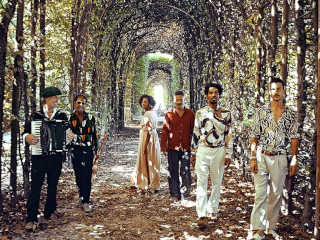
Ayom like to call themselves ‘musical seafarers who traverse the Atlantic with a distinctly Mediterranean identity’ – and with the group’s six members hailing from Angola, Brazil, Greece and Italy, it’s pretty much a spot-on description. Jabu Morales, who left her Brazilian home in 2011 and resettled in Barcelona, is a vibrant presence centre stage, and as singer and percussionist she roots the music in Candomblé and Afro-Brazilian rhythms. Yet it’s merely the launching pad for what she calls the band’s ‘black Atlantic’ music. Ayom were born out of her chance meeting with Italian accordionist Alberto Becucci and the Greek-raised Timoteo Grignani, who plays various percussion instruments including the Brazilian bass drum known as zabumba. They were soon joined by percussionist Walter Martins from Angola, the Portuguese-Angolan guitarist Ricardo Quinteira and bass player Francesco Valente. Their debut (a Top of the World in the Jan/Feb 2021 issue), was recorded in 2019 in an intense two-week session in the home of a Portuguese wine producer south of Lisbon. It’s a joyously eclectic affair that draws on the folk music of Brazil, Cape Verde, Angola and beyond, spiritually bound together by the Afro-Lusophone connection and accented with Mediterranean flavours. Seductive, enchanting, sometimes swinging with a syncopated exuberance and at other times imbued with a bittersweet longing, the melting pot of languages, rhythms and sonorities simmers mouth-wateringly. In an Introducing feature about the band, Alex Robinson called it an album that ‘brings shards of warmth into the room, like tropical sun penetrating grey clouds.’ The group take their identity from the orixá of the tambor that in Candomblé mythology taught humankind to play music and sing. It is the orixá who is pictured on the album cover, flanked on either side by an African drum and European accordion. “Ayom is the connection between male and female, between spontaneity and formality, between the rhythms of Africa and the melodies of Europe. She brings us from separation to seduction, from conflict to celebration,” Morales says with a characteristically romantic flourish. “If Ayom touches you, then please value her. She is a voice of unity. But she’s under threat…” |
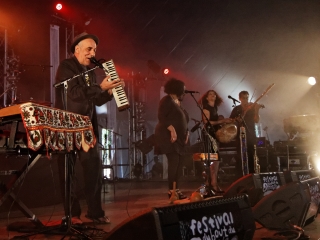
The French global collective hit the mark again on their latest collection. The husky voice of Denis Péan combines with the luminous intonations of the Nid El Mourid sisters over the exquisite arrangements of violinist Richard Bourreau. Interlaced with Touareg, Congolese and Mandinka influences, the result is a therapeutic elixir for our troubled times. |
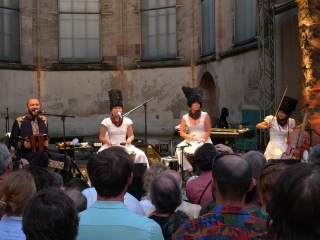
Formed in 2004 by four trained ethnomusicologists in Kiev, DakhaBrakha describe their music as ‘ethno chaos.’ Here they are alternately cinematic, moody, avant-garde and plaintive, but always unpredictable and ready at any moment to launch into a wild, romping ethno-punk rave-up with bagpipes blaring. The ensuing bedlam is as appealing as it is artful. |

The fifth album from Tamikrest not only riffed and rocked as powerfully as we have come to expect, but took them into spacey, psychedelic moods that had our reviewer suggesting that if Tinariwen were the Beatles of West African desert rock and Songhoy Blues the genre’s answer to the Clash, then Tamikrest might just be the Saharan Pink Floyd. |

When Mariza emerged 20 years ago she was hailed as the successor to Amália Rodrigues (1920-1999), queen of Portuguese fado. Mariza modestly discouraged the comparisons, but has since earned the right to be ranked alongside her. This album of rich interpretations of Amália’s songs is both tribute and a claim to the throne. |

The indefatigable Kronos Quartet asked Jacob Garchik to transpose 15 of Pete Seeger’s folk songs for their most recent album. The results make even such familiar tunes as ‘Turn Turn Turn’ and ‘Where Have All the Flowers Gone?’ sound fresh, while Sam Amidon and Ethiopian Meklit Hadero are among the guest vocalists. |

As a collector and interpreter of English folk songs, Lee has few contemporary rivals and his third album finds him reaching fresh heights of ambition. Familiar songs such as ‘Spencer the Rover’ and ‘The Garden of England’ are radically reworked with Lee’s keening voice set against an arresting soundscape of cello, bass and percussion. |
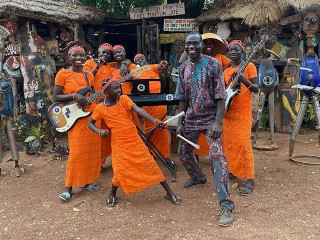
Aged between ten and 17, these seven young women from Benin were assembled via a call-out for talent on a local radio station. The resulting album could have been a cheap gimmick – but instead it proved to be a glorious global-pop fusion of voodoo rhythms, highlife and Congolese rumba with trace elements of psychedelia and garage-rock. |

American banjo player Washburn and the Chinese guzheng (zither) player Fei fuse two very different traditions as they interweave strings on an album where bluegrass and Chinese folk songs sit side by side. Yet there’s nothing forced about the music as Béla Fleck’s production makes the collaboration seem transcendentally natural. |

Singing in the ancient French regional language of Occitan accompanied mainly by percussive handclaps and foot-stomping, Caroline Dufau and Lila Fraysse regenerated an ancient folkloric tradition with their polyphonic harmonies on an exuberant album. The energy and passion binding the diverse songs is nothing short of breathtaking. |
Photo Credits:
(1),(2),(5) Damir Imamović,
(3).(6) Songlines,
(4) Khusugtun,
(7) Jake Blount,
(8) Siti Muharam,
(9) Bab L’ Bluz,
(10) Liraz ,
(11) Ayom ,
(12) Lo’Jo,
(15) Mariza,
(16) Kronos Quartet ,
(18) Star Feminine Band,
(19) Wu Fei & Abigail Washburn,
(20) Cocanha
(unknown/website);
(13) DakhaBrakha ,
(14) Tamikrest,
(17) Sam Lee
(by Walkin' Tom).